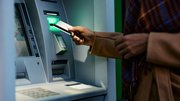News
80 percent of ATMs distributing euros by Jan. 2
January 2, 2002
BERLIN -- After the first day of the changeover, 80 percent of the 12-country euro zone's 200,000 ATMs were dispensing euros, with the figure reaching 100 percent in Austria, Germany, Luxembourg and the Netherlands, according to an Associated Press report.
Few glitches were reported, and emand for money from the machines reached four times the daily average on Jan. 1, the European Central Bank said.
"The euro cash changeover is going smoothly, even better than we had expected,' according to the bank's Eugenio Domingo Solans.
The euro, which bought $1.17 U.S. at its inception in January of 1999, quickly lost ground in value and reached a low of nearly 82 cents U.S. in the fall of 2000. It brought 90.36 cents at the markets in New York City on Jan. 3, up from 89.13 cents.
Analysts said the euro's smooth arrival, refuting months of speculation about the potential for chaos during the changeover, might have been responsible for the rise. Larry Kantor, the global head of foreign exchange strategy at J. P. Morgan, said in a New York Times report, "One of the things was some kind of psychological boost from the introduction of the euro bills and coins."
Minor hitches were reported in almost all countries.
Traffic backed up on toll booths outside Athens, Greece, on highways in Italy and on the main bridge into Lisbon, Portugal as drivers tried to get euros as change from attendants. Authorities appealed to drivers to use exact change.
Lines were longer than usual at some banks and post offices. In Naples, Italy, police were called when retirees waiting for their first euro pensions got unruly. To help foster acceptance of the new currency, Greek Premier Costas Simitis visited five banks in Athens and asked customers to show patience.
Bank unions in France and Italy tried to stage strikes but drew little support and caused only minor disruptions.
Officials warned shoppers to beware of salespeople giving incorrect change. But the difficulty of the new conversions was evident when reporters asked Portuguese Finance Minister Guilherme Oliveira Martins to give the escudo equivalent of 100 euros.
``That's ... er ... well, it's going to take some time to get used to it all,' he replied.
Some stores even used the confusion as a marketing tool.
The big German supermarket chain Aldi rounded prices down, resulting in price cuts averaging 2 to 3 percent. Rival Rewe dropped prices on about 250 items and promised it wouldn't raise any prices, and Kaufland boasted that prices on 1,300 items were lower than before.
National currencies will continue to circulate side by side with the euro for up to two months.
Austria, Belgium, Finland, France, Germany, Greece, Ireland, Italy, Luxembourg, the Netherlands, Portugal and Spain make up the new euro-zone.
If the euro's cash debut continues to proceed without major problems, it could have an important impact on public attitudes in the three E.U. countries that have not adopted the common currency: Britain, Sweden and Denmark.
Recent opinion polls in both Sweden and Denmark suggest that a slight majority of both populations now supports adopting the euro. In Sweden, Prime Minister Goran Persson suggested last week that the country might hold a referendum on the question as early as this fall.













